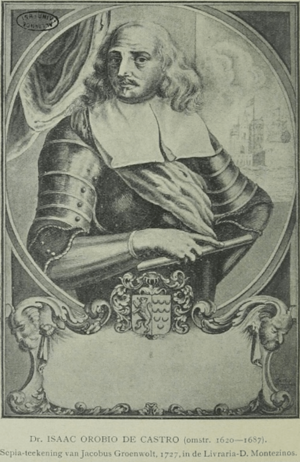Isaac Orobio de Castro facts for kids
Balthazar (Isaac) Orobio de Castro (born around 1617 in Bragança, Portugal – died November 7, 1687, in Amsterdam) was a smart philosopher, physician (doctor), and religious writer. He was a Portuguese Jew who defended his faith.
Contents
Isaac Orobio de Castro's Early Life and Studies
When Isaac was a child, his family moved to Seville, Spain. His parents were Marranos, which meant they were Jewish but had to pretend to be Christian because of the rules in Spain at the time.
Isaac was a very good student. He studied philosophy at Alcalá de Henares and later became a teacher of metaphysics (a branch of philosophy about basic truths) at the University of Salamanca. After that, he decided to study medicine. He became a very popular doctor in Seville. He even worked for important people like the Duke of Medina-Celi and a family close to the king.
Challenges and Moving to Amsterdam
Isaac Orobio de Castro was married and had a family. However, a servant he had punished for stealing told the Inquisition that Isaac was secretly practicing Judaism. The Inquisition was a powerful religious court that questioned people about their beliefs.
Isaac was put in a dark, small prison for three years. He faced very difficult times and questioning, but he kept saying he was innocent. Eventually, he was released. But he had to leave Spain and wear a special penitential garment called a sanbenito for two years.
After leaving Spain, he went to Toulouse, France. There, he became a professor of medicine at the university. The French king, Louis XIV, even gave him a special title. But Isaac was tired of pretending to be something he wasn't. Around 1666, he moved to Amsterdam, which was a more tolerant city.
In Amsterdam, Isaac openly declared his Jewish faith and took the name "Isaac." He continued to work as a doctor and became very famous. He was chosen to be part of the leadership of the Portuguese Jewish community and joined several poetry groups. He passed away in Amsterdam. His wife, Esther, died later in 1712.
Isaac Orobio de Castro's Writings
Isaac Orobio de Castro wrote many books and papers. One of his most famous works is called Certamen Philosophicum Propugnatæ Veritatis Divinæ ac Naturalis Adversus J. Bredenburgi Principia. It was published in Amsterdam in 1684. In this book, he discussed the ideas of another famous philosopher, Baruch Spinoza, with whom he also had friendly discussions. This work was later translated into Spanish and English.
Many of his other writings are still in manuscript form (meaning they weren't printed as books). Some of them include:
- Prevenciones Divinas Contra la Vana Ydolatria de las Gentes: This work warned against false idol worship.
- Explicação Paraphrastica sobre o Capitulo 53 do Propheta Isahias: This was an explanation of a chapter from the biblical prophet Isaiah.
- Tratado em que se Explica la Prophesia de las 70 Semanas de Daniel: This explained the Prophecy of Seventy Weeks from the Book of Daniel.
- Epistola Invectiva Contra un Judio Philosopho Médico, que Negava la Ley de Mosse, y Siendo Atheista Affectava la Ley de Naturaleza: This was a letter written against another doctor and philosopher, Juan de Prado, who questioned religious laws.
Long after Isaac's death, a book called Israel Vengé was published in French, claiming to be his work. It was later translated into English.
Isaac also had important discussions about Christianity with a Dutch preacher named Philipp van Limborch. These discussions were later published in a book called De Veritate Religionis Christianæ Amica Collatio cum Erudito Judæo in 1687.
The de Castro Family
The de Castro family has many branches, all originally from Spain and Portugal. Some family members kept the name "De Castro". Others used names like De Castro-Osorio, De Castro Sarmento, Pereira de Castro, and Orobio de Castro.
You can find more details about other members of this family in a separate article.
See also
 In Spanish: Isaac Orobio de Castro para niños
In Spanish: Isaac Orobio de Castro para niños
- De Castro family (Sephardi Jewish)
- Marranos
- Crypto-Jews
- History of the Jews in the Netherlands
 | George Robert Carruthers |
 | Patricia Bath |
 | Jan Ernst Matzeliger |
 | Alexander Miles |


